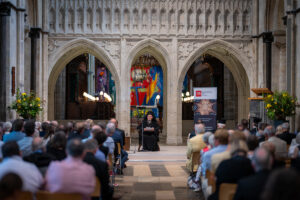The Iranian government targets converts to Christianity because it considers them to be apostates and threats to the state.
The U.S. State Department has classified Iran as a “country of particular concern” for “having engaged in or tolerated particularly severe violations of religious freedom.”
For previous ChristianPersecution.com coverage of Iran, see here.
“10-year sentence for Iranian-Armenian for ‘disturbing’ Christian teaching,” Article 18, May 5, 2022:
An Iranian-Armenian Christian faces 10 years in prison for teaching other Christians in his home, or what a notorious judge called “propaganda contrary to and disturbing to the holy religion of Islam”.
Anooshavan Avedian, who will celebrate his 60th birthday on Saturday, was sentenced last month alongside two of the members of his house-church, Abbas Soori, 45, and Maryam Mohammadi, 46, who are both converts to Christianity and who received a range of non-custodial punishments.
In addition to his 10-year sentence, Anooshavan also faces 10 years’ “deprivation of social rights” after his release, for example by restricting the types of employment he can have.
Abbas and Maryam were also handed this 10-year deprivation, as well as two-year bans on any travel abroad, membership of any political or social group, and also of residence in their home province of Tehran or any adjacent province….
The two converts were also fined 50 million tomans ($2,000) each and told they must regularly report to the offices of the Ministry of Intelligence (MOIS).
All three Christians have appealed against the verdict, which was issued on 11 Aprilat [sic] the 26th Branch of the Revolutionary Court of Tehran by Judge Iman Afshari, who is also the head of intelligence at the court and who has been building a reputation in recent years by issuing some of the harshest sentences against Christians….
The three Christians had been summoned to face charges of “propaganda activity against the system” and “acting against the country’s security through organisation and leadership of an Evangelical Christian house-church”.
In his sentencing, Judge Afshari found Anooshavan guilty of “establishing and leading an illegal group with the aim of disrupting the security of the country through educational and propaganda activities contrary to and disturbing to the holy religion of Islam, through the dissemination of false claims … as well as contact with foreign countries, or organisational guidance from abroad”….
Maryam and Abbas were also convicted under the same article for membership of Anooshavan’s “illegal” group (house-church).
The Christians’ defence was met with disrespectful remarks towards their character, and insults to their faith.
The only “evidence” brought against them were the reports compiled by MOIS agents, including “confessions” extracted under duress….
The charges against the three Christiansblended [sic] elements of Articles 498, 499 and 500 of the penal code, relating to organisation (498) and membership (499) of “anti-state” groups, and propaganda (500) “contrary to Islam”, though only Article 500 was mentioned in the court document.
Though Christians are one of three recognised religious minorities in Iran, in practice only ethnic Armenians and Assyrians are permitted a degree of freedom to worship, but only within their own ethnic tongues, and not the national language of Persian.
Over the past decade, the Iranian authorities have closed down almost all churches that offered services in the national language of Persian, or insisted they teach only in the ethnic minority languages.
But the vast majority of Christians in Iran today are converts from at least nominally Islamic backgrounds, and therefore these Christians (who are thought to number several hundred thousand) have no official place to worship.
As a result, many now meet in their homes, in what have became known as house-churches.
Judge Afshari even admitted in his verdict that Anooshavan’s house-church had only been created because of the forced closure in 2013 of the Central Assemblies of God Church in Tehran.
But even though the house-churches set up in the wake of such closures are no different in practice from any other Christian worship meetings around the world, they have been outlawed by the authorities, which referred to them in an official response to the UN last year as “enemy groups” of a “Zionist cult”….







